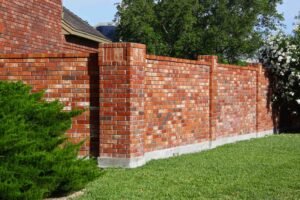The costly mistake 90% of homeowners make with their brick homes? They don’t seal them. Brick may look tough, but it’s not waterproof. In Mobile’s hot, humid climate, unsealed bricks act like sponges. They soak up moisture, trap heat, and slowly begin to crumble.
By the time you see stains or cracks, the damage is already done. Sealing your brick home isn’t a luxury—it’s protection.
Your home deserves the best care. If it’s been years since your brick was sealed or never sealed at all. Contact the top masonry contractor in Mobile, AL.
Phone: (251) 283-5661
Email: contact@mobilemasonryal.com
Does Every Brick House Need Sealing?
Not always. Some bricks are already water-resistant and dense. Some absorb water more rapidly and are more porous. Here in Mobile, where storms and humidity are common, many older homes can benefit from sealing.
To know if your home needs it, you should check for signs like:
- Efflorescence
- Mold or mildew
- Dark patches after rain
- Cracks in mortar or flaking brick
If you see any of these, sealing might be the smart move.
Why Homes in Mobile Need Extra Protection
The climate of Mobile is hot and humid. That mix of heat and humidity can slowly break down even the toughest materials. Water finds its way into bricks, especially during heavy rains or hurricanes.
When moisture sits inside bricks and freezes or heats up, it expands—and that can lead to cracking, mortar damage, and even structural problems over time.
That’s why many local homeowners trust a local masonry contractor to inspect and seal their homes every few years.
If you live in Mobile, AL, and want to protect your home from moisture, damage, and time, then sealing is a wise investment.

Benefits of Sealing Your Brick House
When done correctly, it can have a significant impact. Here’s what it helps with:
1. Water Protection
Sealing stops water from getting into the brick. This reduces the possibility of mold, mildew, or damage in the wall.
2. Longer Life
Bricks are durable. But sealing gives it extra years by stopping early wear and tear.
3. Better Look
Unsealed bricks may discolor or fade over time. It keeps the color fresh and the surface clean.
4. Energy Efficiency
Wet bricks can trap heat and affect your home’s insulation. Your indoor temperature can be better controlled with a dry wall.
5. Fewer Repairs
By stopping water from getting in, sealing reduces the chances of cracks, spalling, and mortar decay.
When Should You Avoid Sealing Brick?
Sealing is not always the best option. Avoid it if
1. The Bricks Are New
Bricks that have just been laid take six to twelve months to cure. If you seal too soon, moisture will be trapped inside and cause damage.
2. The Bricks Have Existing Moisture Issues
If bricks are already damp, sealing locks in moisture. Always fix leaks or drainage problems first.
3. You Use the Wrong Sealant
Not all sealants are breathable. Siloxane or silane-based sealers allow vapor escape. Avoid acrylic sealers—they trap moisture.
Why Hire a Local Masonry Contractor?
From salt in the air to hurricane season, local professionals are aware of the challenges your home faces. They can find damage early, recommend the right sealer, and get the job done safely and neatly.
Mobile Masonry Contractor has helped protect homes across Mobile, AL for years. Their team offers honest advice, skilled service, and long-lasting results.
Have questions? Need a free, quick quote?
Call: (251) 283-5661
Email: contact@mobilemasonryal.com
Frequently Asked Question(s)
Most sealers last 5–10 years. But in Mobile, due to heavy rain and moisture, it’s smart to have your bricks checked every 3–5 years.
Technically, yes. But it is easy to miss spots or use the wrong product. Hiring a professional ensures your bricks get full coverage and long-term results.
Spray a little water on the brick. If it beads up, it is sealed. If it soaks in and darkens the surface, it’s likely unsealed or needs resealing.
Most pros recommend waiting at least 30 days after construction to allow the bricks and mortar to fully cure. After that, sealing helps protect your new investment from day one.



